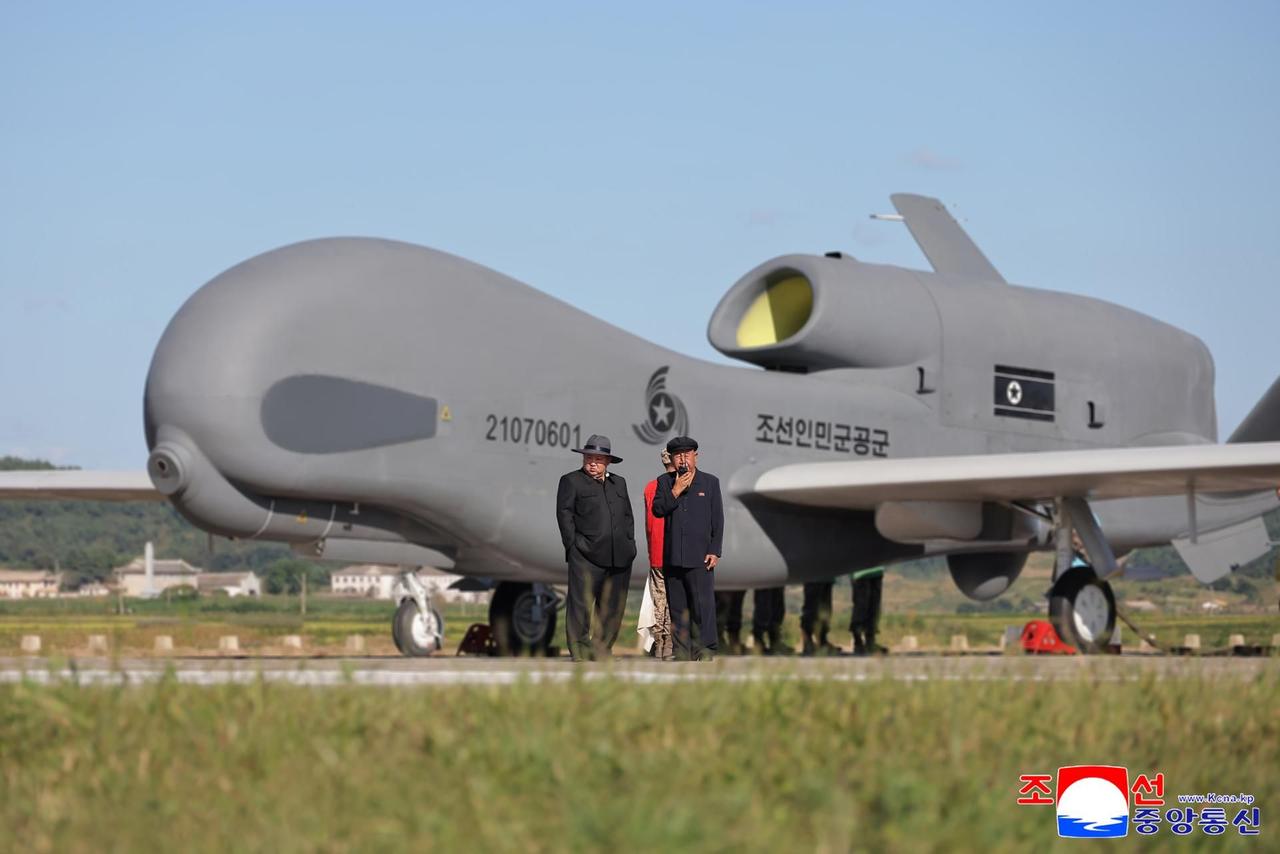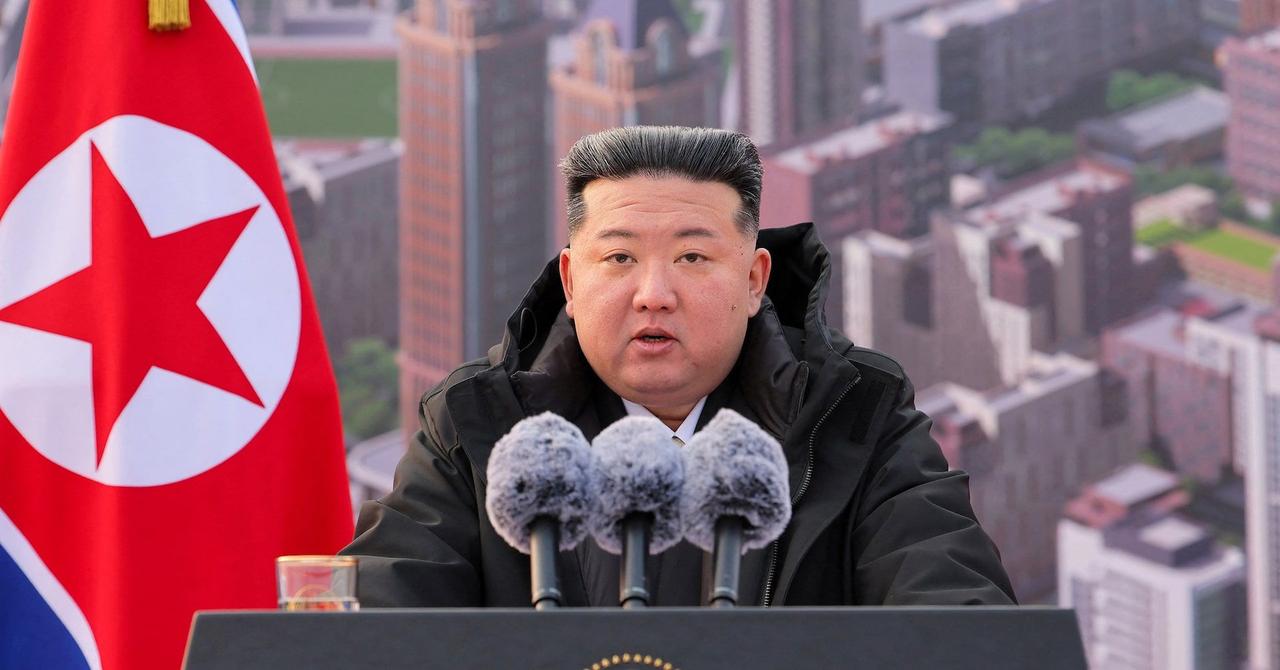North Korea's Kim Jong Un Prioritizes AI-Powered Drones for Military Modernization
5 Sources
5 Sources
[1]
Kim Jong Un Says Advancing AI for Drones Top Military Priority
North Korean leader Kim Jong Un oversaw tests of new combat and reconnaissance drones this week, calling unmanned aerial vehicle development a top-priority for modernizing the country's armed forces. On Thursday, Kim inspected weapons, surveillance vehicles and multipurpose drones at North Korea's Unmanned Aeronautical Technology Complex, the official Korean Central News Agency said. He emphasized that developing artificial intelligence and improving the operational ability of unmanned weapons have become a top priority for strengthening North Korea's armed forces, citing recent warfare that use unmanned equipment as a key military asset.
[2]
North Korea's Kim oversees drone test, orders AI development
Seoul (AFP) - North Korean leader Kim Jong Un oversaw a test of an attack drone and ordered greater use of artificial intelligence (AI) in the technology, state media said Friday. Images shared by the official Korean Central News Agency showed the unmanned vehicle taking off and then destroying a target. State media said the exercise demonstrated the "excellent combat effectiveness of Kumsong-series tactical attack drones", reporting Kim expressed "great satisfaction" with the result. Drones are emerging as a "major military activity asset, raising it as a top-priority and important task in modernizing the armed forces of the DPRK," Kim reportedly said, using the acronym for North Korea. He also ordered "efforts to rapidly developing the newly-introduced artificial intelligence technology" as well as the "expanding and strengthening" of drone production capabilities. Analyst Hong Min at Seoul's Korea Institute for National Unification said Kim sees drone technology as critical to securing "great power status". "The drones raise concerns because they offer low-cost, high-efficiency threats: autonomous mission execution, improved accuracy and lethality, suitability for mass production, and enhanced tactical flexibility," he added. Lessons from Russia Pyongyang unveiled its first attack drones last year and experts have warned its new capability in this area could be linked to its budding alliance with Russia. Analysts also say North Korean troops sent to fight for Russia will be gaining modern warfare experience -- including how drones are used on the battlefield. And Lim Eul-chul at South Korea's Kyungnam University said AI could allow North Korean drones to "operate even if GPS or communications signals are jammed, relying on pre-trained algorithms". North Korea has tested GPS jamming attacks on the South Korean assets -- an operation that affected several ships and dozens of civilian aircraft. "The AI drive has gained momentum since 2024, drawing on Russian technology transfers and lessons from the war in Ukraine," Lim said. South Korean and Western intelligence agencies have said the North sent over 10,000 soldiers to Russia in 2024 -- primarily to the Kursk region -- along with artillery shells, missiles and long-range rocket systems. Around 600 North Korean soldiers have been killed and thousands more wounded fighting for Russia, Seoul has said.
[3]
North Korea's Kim Jong Un Oversees Drone Testing, KCNA Says
SEOUL (Reuters) -North Korean leader Kim Jong Un oversaw the testing of unnamed drones on Thursday and ordered their capabilities be strengthened through artificial intelligence, state media KCNA said on Friday. Kim supervised the test of suicide drones with AI technology in March. On Thursday, Kim was satisfied with the test results of North Korea's 'Kumsong' tactical unmanned attack aircraft and an unmanned strategic reconnaissance aircraft, and approved a plan to further strengthen unmanned aerial vehicles' capabilities, KCNA said. Kim also inspected on Thursday the construction of a large greenhouse farm in Sinuiju, which borders China, KCNA said. (Reporting by Joyce Lee; Editing by Richard Chang)
[4]
North Korea's Kim Jong Un oversees drone test, orders AI development
North Korean leader Kim Jong Un oversaw a test of an attack drone and ordered greater use of artificial intelligence (AI) in the technology, state media said Friday. Images shared by the official Korean Central News Agency showed the unmanned vehicle taking off and then destroying a target. State media said the exercise demonstrated the "excellent combat effectiveness of Kumsong-series tactical attack drones", reporting Kim expressed "great satisfaction" with the result. Drones are emerging as a "major military activity asset, raising it as a top-priority and important task in modernizing the armed forces of the DPRK," Kim reportedly said, using the acronym for North Korea. He also ordered "efforts to rapidly developing the newly-introduced artificial intelligence technology" as well as the "expanding and strengthening" of drone production capabilities. Analyst Hong Min at Seoul's Korea Institute for National Unification said Kim sees drone technology as critical to securing "great power status". "The drones raise concerns because they offer low-cost, high-efficiency threats: autonomous mission execution, improved accuracy and lethality, suitability for mass production, and enhanced tactical flexibility," he added. Lessons from Russia Pyongyang unveiled its first attack drones last year and experts have warned its new capability in this area could be linked to its budding alliance with Russia. Analysts also say North Korean troops sent to fight for Russia will be gaining modern warfare experience -- including how drones are used on the battlefield. And Lim Eul-chul at South Korea's Kyungnam University said AI could allow North Korean drones to "operate even if GPS or communications signals are jammed, relying on pre-trained algorithms". North Korea has tested GPS jamming attacks on the South Korean assets -- an operation that affected several ships and dozens of civilian aircraft. "The AI drive has gained momentum since 2024, drawing on Russian technology transfers and lessons from the war in Ukraine," Lim said. South Korean and Western intelligence agencies have said the North sent over 10,000 soldiers to Russia in 2024 -- primarily to the Kursk region -- along with artillery shells, missiles and long-range rocket systems. Around 600 North Korean soldiers have been killed and thousands more wounded fighting for Russia, Seoul has said.
[5]
N. Korea's Kim oversees performance test of tactical attack drones - The Korea Times
North Korean leader Kim Jong-un has overseen a performance test of tactical attack drones, stressing the need to apply artificial intelligence (AI) technology to them and advance their operational capabilities, state media reported Friday. Kim inspected the test of unmanned weapons developed and produced by an institute and enterprise under the Unmanned Aeronautical Technology Complex on Thursday, according to the Korean Central News Agency (KCNA). The leader reviewed the performance and combat applicability of strategic and tactical reconnaissance drones, as well as multipurpose unmanned aerial vehicles. The test approved the effectiveness of Kumsong-series tactical attack drones for combat uses, along with strategic reconnaissance drones' capabilities, the KCNA said. North Korean state media reported on Kumsong-line tactical attack drones for the first time. "Advancing AI and operational capabilities of unmanned weapons and equipment systems should be the top priority in modernizing the armed forces," he said, stressing that drones have emerged as key military assets in modern warfare, according to the KCNA. In March, the North supervised performance tests of "suicide attack drones" equipped with AI technology, calling for their development and technological advance. North Korea has been focusing on developing drones, especially since it sent troops to Russia to support Moscow's war with Ukraine, where drones are playing a major role in combat.
Share
Share
Copy Link
North Korean leader Kim Jong Un oversees tests of new combat and reconnaissance drones, emphasizing the development of AI-powered unmanned aerial vehicles as a top priority for modernizing the country's armed forces.
North Korea's Push for AI-Powered Drones
North Korean leader Kim Jong Un has placed a strong emphasis on the development of artificial intelligence (AI) and unmanned aerial vehicles (UAVs) as a top priority for modernizing the country's armed forces. In a series of recent events, Kim personally oversaw tests of new combat and reconnaissance drones, signaling North Korea's commitment to advancing its military capabilities through cutting-edge technology
1
2
.
Source: Korea Times
Kumsong-Series Tactical Attack Drones
The tests, conducted at North Korea's Unmanned Aeronautical Technology Complex, showcased the performance of the newly introduced Kumsong-series tactical attack drones. State media reported that the exercise demonstrated the 'excellent combat effectiveness' of these drones, with Kim expressing 'great satisfaction' with the results
2
4
. The unveiling of these attack drones marks a significant development in North Korea's military arsenal.Strategic Reconnaissance and Multipurpose Drones
In addition to the tactical attack drones, Kim also inspected strategic reconnaissance drones and multipurpose UAVs. The North Korean leader approved a plan to further strengthen the capabilities of these unmanned aerial vehicles, highlighting their importance in modern warfare
3
5
.Emphasis on Artificial Intelligence
Kim Jong Un has ordered 'efforts to rapidly develop the newly-introduced artificial intelligence technology' for enhancing drone capabilities
2
. Experts suggest that AI could allow North Korean drones to operate even if GPS or communications signals are jammed, relying on pre-trained algorithms4
. This focus on AI aligns with North Korea's broader strategy to modernize its military and achieve what Kim refers to as 'great power status'2
.
Source: Bloomberg
Potential Russian Influence
Analysts have pointed out that North Korea's advancements in drone technology could be linked to its growing alliance with Russia. It is believed that North Korean troops sent to support Russia's war in Ukraine are gaining valuable experience in modern warfare, including the use of drones on the battlefield
2
4
. Some experts suggest that the AI drive in North Korea has gained momentum since 2024, drawing on Russian technology transfers and lessons from the ongoing conflict4
.Related Stories
Implications for Regional Security
The development of AI-powered drones by North Korea raises concerns among neighboring countries and the international community. These drones are seen as low-cost, high-efficiency threats that offer autonomous mission execution, improved accuracy and lethality, suitability for mass production, and enhanced tactical flexibility
2
4
. The potential for North Korea to use these advanced drones in future conflicts or provocations adds a new dimension to regional security dynamics.Future Prospects
As North Korea continues to prioritize the development of AI and drone technology, it is likely that we will see further advancements and tests in the coming months and years. The country's focus on modernizing its armed forces through unmanned systems and artificial intelligence reflects a broader trend in global military technology, with potential implications for international relations and security in the Korean Peninsula and beyond
1
5
.References
Summarized by
Navi
Related Stories
Recent Highlights
1
ByteDance's Seedance 2.0 AI video generator triggers copyright infringement battle with Hollywood
Policy and Regulation

2
Demis Hassabis predicts AGI in 5-8 years, sees new golden era transforming medicine and science
Technology

3
Nvidia and Meta forge massive chip deal as computing power demands reshape AI infrastructure
Technology








